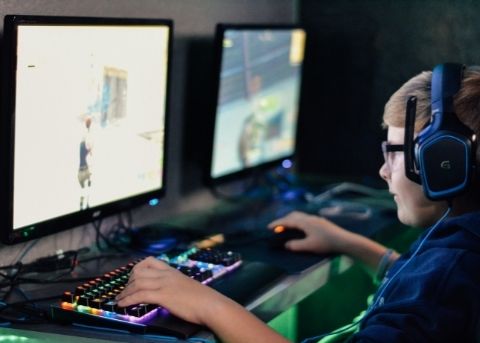 Are video games as useful as books when it comes to teaching or learning literacy? While the term ‘useful’ is open to interpretation, what it boils down to is having the right tools available to us as educators to enable our students to best learn the literacy skills that will set them up for life.
Are video games as useful as books when it comes to teaching or learning literacy? While the term ‘useful’ is open to interpretation, what it boils down to is having the right tools available to us as educators to enable our students to best learn the literacy skills that will set them up for life.
If we were to compare books to video games, it would draw a similar comparison to apples and oranges. Both are vehicles for delivering activities students use to learn, however the way they look and the experience they offer is greatly different. To this end, this is not an argument for or against the use of books or video games in teaching and learning literacy. Rather, it’s an outline of how using both these tools is ultimately advantageous for students.
Inspiring a love of learning and finding fun in the learning experience is the key for students of all subjects, including literacy.
Even Ancient Romans associated the concept of primary school (ludus) with play (ludere). When learning is fun, students are more likely to be interested in what you’re teaching, feel more relaxed during the class and therefore be better able to retain information.
Graham Glass
Having existed in a relatively similar form since their invention many hundreds of years ago, books are a proven method of documenting and passing on information in an ordered manner. Comparatively, video games are in their infancy. And as an entirely alternate learning format to books, widen the audience of students we can reach.
Effectiveness of video games as a literacy tool
Video games introduce us to new worlds in a more visual and interactive way, expanding our understanding of creativity, communication and relationships. Its non-traditional delivery of learning concepts is what some purists would argue acts against formal teaching methods. Conversely, it’s this alternate format of teaching that leads to video games having the potential to draw in more students. Video games include motivational and competitive elements that give students targets to aim towards, further motivating them to continue their exploration of the topic, text or skill.
Since their creation, books have been designed to pass on knowledge, stories, facts, standards, reasoning, and list the goes on. Books give us the permission, encouragement and means to dig to a deeper understanding of topics in which we’re interested. Books have a powerful effect on building our conceptual foundation on a specific topic, or a particular point in time, in the case of fiction.
In the UK’s National Literacy Trust 2020 survey of thousands of young people’s relationship with video games and literacy, 73% of those who don’t enjoy reading said playing video games helps them feel more part of a story than reading a book-based text.
The fact that we learn in different ways speaks for video games’ effectiveness and deserved place in the resources called upon to teach literacy. In fact, there are many who have written on the symbiotic relationship between reading books and playing video games, going so far as to say video games may be some of the best ways to teach life skills.
Recognising that as there are many ways one can be literate, there are different ways to learn texts, instructions and visual directions. Rather than replace books, video games will complement students’ understanding of their worlds. Video games have a lot to teach us about learning and literacy.
Ultimately, we’re not pitching video games and books against one another. There is an opportunity to offer both for the betterment of a student’s education. There is a strong argument for mixing education and entertainment, as it fosters interest in learning and inherently offers a rewards aspect that generates more significant engagement levels than traditional learning.

Video games and books are the perfect match in LiteracyPlanet
The sole reason LiteracyPlanet exists is to produce a literacy platform that nurtures the desire in students to continue reading for the rest of their lives.
To achieve this, we provide highly engaging and interesting texts and articles that ignite students’ interest in the world around them. Subsequently, this nurtures a desire to know more and learn more. Nowhere is this more prominent than in the comprehension activities and missions available, as well as the popular digital magazine, Intrepizine.
Teachers can use Intrepizine to foster an interest in topics. As well, the vocabulary list at the end of each article (there’s three new ones every week!) is a great starting point for creating your own custom word lists, one of the most popular tools in the program. These lists are used in LiteracyPlanet activities, reinforcing spelling and comprehension skills, while gamifying the experience with rewards, leaderboards and plenty of fun. In a bonus for both teacher and student, LiteracyPlanet automates the process of recognition, saving you time and offering the student instant feedback.
The lore of the world of LiteracyPlanet is important in itself. Stories are embedded in the program, drawing the initial and ongoing interest in the platform, games and progression. No other literacy product weaves in such dynamic story and characters. Instead of building a platform of boring content and a pure focus on comprehension strategies for passive readers, LiteracyPlanet encourages further exploration and learning with interesting, updated and incredibly varied content. Opening students’ worlds to new genres, nowhere else will you find informative and fun articles on topics as varied as bees, hoverboards and fried rice!
Video games and books both continue to teach literacy
Books offer readers motivation to pursue their chosen topic and fulfil a particular interest. Video games offer motivation and encouragement through tiered levels, achievements, rewards and self-sufficiency. Both confidently hold their place in the classroom and will continue to complement the other in benefitting the literacy learning experience.





